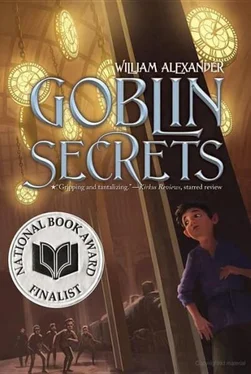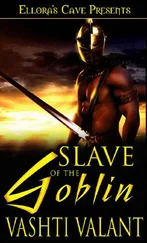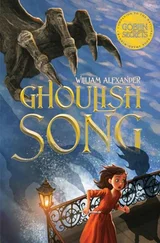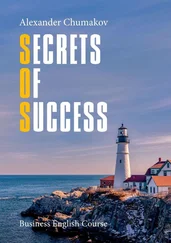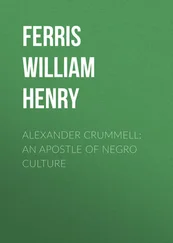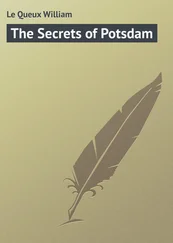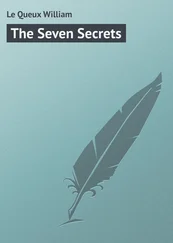“Find him,” said Semele. “Take the raft we left behind. We will meet you at home, yes.”
Nonny nodded, tugged on the rope, and plummeted down.
“He’ll be okay, won’t he?” Rownie asked.
“Patch can’t swim,” Essa said. She didn’t say anything after that.
Rownie remembered the sight of Patch falling. Rownie watched him fall, and then watched again, and felt like he was falling with him.
In silence the troupe unfolded the gearworked mule and set off along Riverside Road, back toward the city. Rownie put his gloves and hat back on, to hide how unChanged he was.
They did not get very far.
At a crossroads, underneath the long shadow of a manor house and a few smaller shacks, a fallen tree blocked the road to Zombay. Children played a circle game near the tree, singing, “Tamlin, tinker man, beggar man, thief!” all together, all in one voice, and the one tagged “thief” had to chase the tagger around and around and around before the circle closed.
Rownie knew the game. He had played it before. He had run around the circle while Grubs sang the song. Curse thrower, charm monger, Change maker, thief! False face, fox face, clock face, thief!
The children stopped singing and stared at the wagon.
Rownie sat on the driving bench between Thomas and Essa. He peered out from underneath his own small hat and checked the faces of the children to make sure that none of them were Grubs. They weren’t Grubs. They wouldn’t be, this far outside the city.
“Can we go around?” Essa asked.
“No,” said Thomas. “We cannot go around. The crossing road leads to nowhere important in either direction.”
The old goblin climbed down from the bench and waved his cane angrily at the fallen tree.
“Why has no one in the village removed this roadblock? Why is no one doing so now? It is disrespectful to travelers to leave such a task until morning.”
The oldest and tallest of the local children came forward. “This is a town,” he said. “It’s not a village.” He said it with pride and disdain.
“Uh-oh,” Essa whispered.
“What is your name, boy?” Thomas asked, planting his cane firmly on the ground and leaning forward.
“Jansin,” the local boy said. He said it as though Thomas should recognize it, as though anyone and everyone should know who he was.
“This is not a town , young Jansin,” Thomas said. “This is a crossroads with a fancy house nearby, and I flattered the place to call it a village. And you should not, incidentally, be singing and cavorting at a crossroads. You might disturb the graves of innumerable scoundrels, buried here so that they can never find their way home to take up haunting. It is unwise to show disrespect to the dead—or to travelers, who have very far to go. Please fetch someone to help remove this tree.”
Jansin crossed his arms. He did not move otherwise. The other children gathered behind him.
“Why should we care about the crossroads-dead if they were all criminals?” he asked. “Why should we care about travelers if they’re only goblins?”
“This is not good,” Essa whispered. “Rownie, get ready to do something. I’m not sure what, but something. Probably grab Thomas and toss him in the back, so we can ride as fast as we can in some random direction.”
Thomas drew himself up to his full height. The top of his hat almost reached the boy’s shoulder. “Go on and wake the dead beneath you, if it pleases you to do so, but argue with me no further. My companions and I are weary and in grief.”
Jansin marched up to the wagon and pounded on the side with one hand. “You’ve got masks painted here,” he said. “So you’re players, then. Goblin players. Put on a show for us.”
The other smaller children cheered. “A show, a show!”
“We will not,” Thomas said. “We are weary, and we have far to go tonight.”
The boy tossed a coin to the ground. It was a large coin, and it looked to be silver.
Thomas stood over the silver, but he did not pick it up.
“Are you a merchant’s boy?” he asked. “No. You could not be. No one from a merchant’s household would throw wealth around so carelessly.”
“My family owns the biggest coalmaker shops in the city,” Jansin said. He said it with challenge, as though daring anyone to tell him that coalmaking was a dirty business.
“Ah,” said Thomas. “A buyer and seller of hearts. One who believes that any heart can therefore be bought or sold. Well, coal-boy, we do play for coin, and almost any coin—but not for yours.” He used the tip of his walking cane to flick the silver away. It rolled and wobbled back to Jansin. The boy scooped it up off the ground, flush-faced and angry. He threw it, hard, and knocked the hat from Thomas’s head.
“Oh, this is bad,” Essa said. “This is very bad.” She tightened her grip on the reins. “I wonder if Horace could jump over that tree? He’s never jumped before, but we could try it.”
Rownie climbed down from the wagon on the opposite side, out of sight. He ditched his hat and gloves and circled around behind the crowd of children. Their attention was elsewhere. No one saw him in the dusk light. No one noticed Rownie standing behind them, just barely among them. No one noticed that he was unfamiliar.
Thomas, meanwhile, picked up his own huge hat, dusted it carefully, and set it back on his head. Then he unsheathed a thin sword from the length of his cane and held it such that the tip of the blade almost touched the tip of Jansin’s nose.
“I will have an apology from you,” Thomas said. His voice was calm, quiet, and cold.
Jansin glared, clearly afraid, clearly unwilling to take a step backward. The old goblin held his sword steady.
Everyone waited to see what would happen next.
Then a small hatch opened in the side of the wagon with a bang and a snap. Oil lamps burned in bright colors around it. Cheerful music played from one of the music boxes inside.
An intricate wooden puppet in gentleman’s clothes popped through the open hatch.
“Welcome!” the puppet said in a voice that was almost Semele’s. “Welcome, one and everyone! The evening’s entertainment will now begin!”
The crowd of children pushed forward to gather near the puppet stage.
Thomas sheathed his sword and stood aside with a mutter and a grumble. “Unhitch the mule, Essa,” he said. “Help me tie it to that tree. The metal beast had better be strong enough to move it aside.”
Jansin smiled, smug. He had demanded a show from them, and now he had gotten his way.
Rownie looked for the silver coin. He couldn’t help but look for it. He had never even seen silver before. He didn’t find it—one of the other smaller children must have picked it up first. Rownie gave up and pushed through the crowd to stand behind Jansin. The older boy might still be inclined to pick a fight, and if he fought the rest would fight with him.
The show began.
“I hope there’s blood and guts in it!” one of the children said, hopping up and down on her toes with excitement.
An elegant lady puppet took the stage. Semele’s voice sang a story behind it.
Rownie tried to watch the puppet show and Jansin at the same time. It wasn’t easy, and he was distracted by other puppet shows in his head and memory. Rowan used to make shadow puppets against the walls of Graba’s shack—when he still lived in Graba’s shack. He could make shadows of sailing ships and animals, horses and goats and scampering molekeys. He could make silhouettes of people in tall hats or long gowns. Even the loudest and the rudest Grubs would watch and listen. Rownie always held the candle—a dangerous thing to hold over the straw-covered floor, but he was careful. His favorite shadow puppet was the bird, because that was the only one he could manage to make himself, with thumbs hooked together and fingers making feathers. Rowan had promised to teach Rownie how to twist his hands into other puppet shapes, but he hadn’t gotten around to it yet.
Читать дальше
